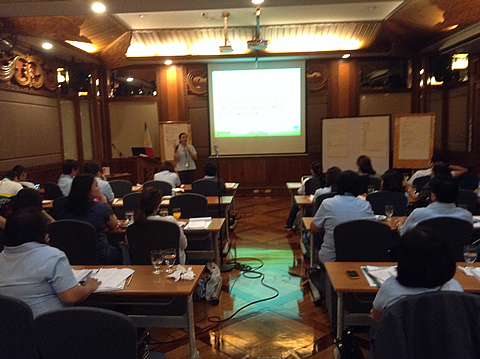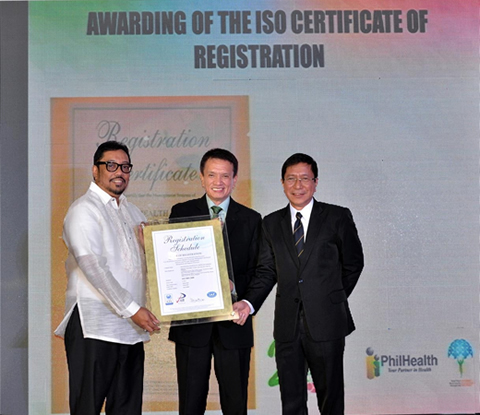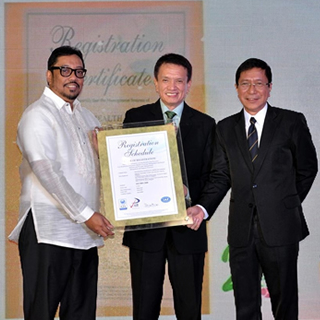PhilHealth
home | contact us | sitemap | disclaimer
News
The Road to ISO 9001: 2008 -
A Journey Worth Taking
April 8, 2015
The PhilHealth Quality Management System
An organization should ensure that its products and services are made along a minimum set of standards or even better, and should continually enhance the quality of service that it provides for its customers to be satisfied.
Cognizant of this, the Philippine Health Insurance Corporation (PhilHealth) has developed and implemented a Quality Management System (QMS) that is certifiable to ISO 9001:2008 to demonstrate its ability to consistently provide quality service to meet its commitment to customers. It has to effectively apply the system, undertake continual improvement and prevent occurrence of non-conformities to standards. “This is something that we look forward to, and we have set our sights for the entire PhilHealth organization to be ISO-certified,” PhilHealth President and CEO Alexander A. Padilla firmly stated.
No less than the President of the Republic has made a statement that “the government needs to regain the citizens’ trust and confidence which it lost apparently due to inconsistent quality of performance characterized by nonconformity of certain services to an established set of standards.”
Sure steps to ISO Certification
For PhilHealth, the journey to ISO Certification began early last year through Office Order No. 51 which approved the implementation of mandatory procedures on Documents and Records Control, Control of Non Conformities, Corrective and Preventive Actions. It also included the conduct of Internal Quality Audit.
By July, the Philippine Social Health Insurance Management System, or PSHIMS, was officially adopted. It covers mandated functions on member coverage, benefit delivery and provider management, and the accompanying management and support processes. All these efforts are in pursuit of a bigger challenge, i.e., to obtain ISO certification, which requires that an organization must establish and implement an effective and efficient QMS that conforms with the requirements of the ISO 9001:2008 or QMS standards.
In one of the recent QMS orientation sessions, the PhilHealth Chief articulated it accurately - he believes that PhilHealth needs ISO standards because “with almost 100 million members, PhilHealth must aspire to be the best agency there is since the expectations from our members are huge, not only in terms of enrollment but also in the services we provide,” and that “part of our worth in PhilHealth is that we really want to make the organization world-class.”
The institutionalization of standards is not without legal basis since it is embodied in Executive Order No. 605 issued in 2007, which directs that government agencies, including Government Owned and Controlled Corporations (GOCCs) shall adopt QMS and pursue ISO certification.
Now ISO certified
Third-party certification audit was conducted by AJA Registrars, Inc. in December last year and the auditors recommended that PhilHealth be immediately granted the ISO 9001:2008 Certification.
Hence, effective December 29, 2014, PhilHealth has already acquired the certification for PhilHealth Quality Management System covering the areas of member and provider management and benefit delivery. This news was met with pride and jubilation by the PhilHealth internal community as they are now part of a corporation that is committed to the highest quality standards and is steadfast in pursuing total customer satisfaction.
What does being ISO certified means for our members? “Sana kapag ISO na kayo mas maayos at mapabilis pa lalo ang proseso kapag pumila kami sa mga opisina ninyo lalong lalo na sa frontline services,” Ronald Leviste, an informal sector member said. Another client member, Remedios Santiago* shared that “so far I am quite satisfied with my transactions with PhilHealth, I hope it will continue to remain that way.”
The ISO 9001 series of standards particularly outlines a process approach in implementing a QMS. It entails a lot of hard work, dedication and commitment from both the management and the employees. As ISO-certified institution, the PhilHealth community is able to see and clearly know what are expected of them, and what is it that they need to do: a commitment to uphold and ensure the utmost satisfaction of clients.
Initially, the ISO certification is awarded to PhilHealth Head Office, to Regional Office IV-A and to Local Health Insurance Office – Calamba. “Soon,” Padilla concluded, “all PhilHealth offices nationwide will also implement the QMS with hopes of eventually becoming ISO-certified as well.” For the meantime, the series of orientations on what the QMS is all about continues. (END) (Amelita L. Buted)


